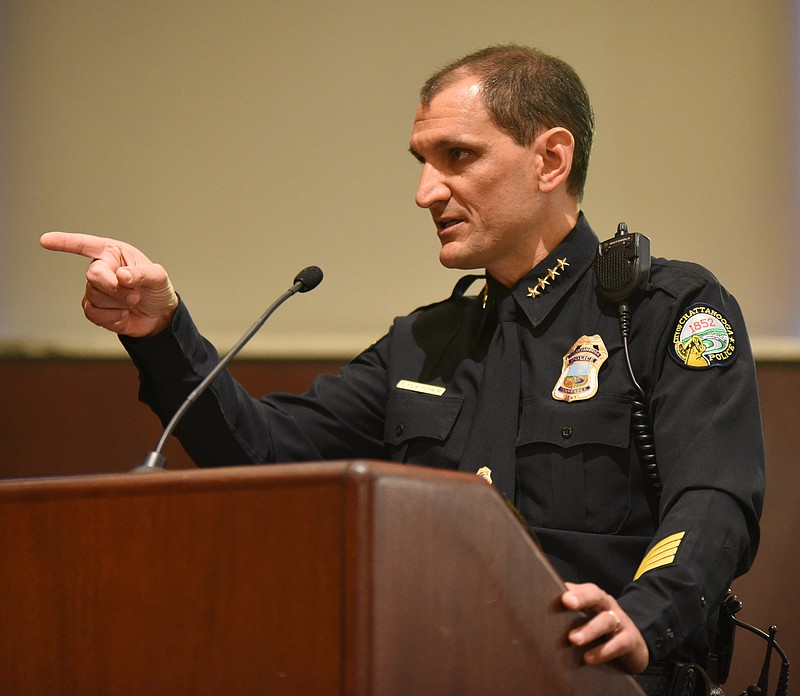Chattanooga leaders soon will consider new social service provider proposals for the Violence Reduction Initiative, the city's flagship gang deterrent program.
The VRI, launched by Mayor Andy Berke and police Chief Fred Fletcher in March 2014, seeks to offer violent gang members a choice: leave the gangs and violence or suffer the consequences of heavy-handed justice. Since fall 2014, Hope for the Inner City has served as a taxpayer-funded gateway for gang members who want peace instead of violence.
 Chattanooga City Councilman Larry Grohn listens to a presentation on the city's wastewater infrastructure during an afternoon agenda session at the City Council building Tuesday, March 29, 2016, in Chattanooga, Tenn. The council voted Tuesday to withdraw its subpoena of District Attorney Neal Pinkston, which the council issued after Pinkston's refusal to appear before the council to discuss the city's violence reduction initiative.
Chattanooga City Councilman Larry Grohn listens to a presentation on the city's wastewater infrastructure during an afternoon agenda session at the City Council building Tuesday, March 29, 2016, in Chattanooga, Tenn. The council voted Tuesday to withdraw its subpoena of District Attorney Neal Pinkston, which the council issued after Pinkston's refusal to appear before the council to discuss the city's violence reduction initiative.Although the city has the option to renew its $290,000 annual agreement with Hope For the Inner City for one more year, officials said the recent request for proposals does not mean dissatisfaction with the organization's work.
Lacie Stone, spokeswoman for Mayor Berke, said in an email that it comes down to refining program scope and details.
"As you can imagine, two years of doing the work has allowed us to understand more of what we need and make the necessary mid-course corrections," Stone said. "We are and should always be looking for ways to do things better, and that includes going through the RFP process to see what organizations and/or partnerships are interested in doing any city work. That said, Hope for the Inner City has done a great job over the last two years, and we hope they submit a proposal for this RFP as well."
The recent request for proposals clarifies social service provider responsibilities with a number of bullet points, requiring the agency to provide a single access point for all services, counseling and case management for member development plans and regular reporting and evaluation to improve programming. It calls for the provider to address a wide range of needs, including mental health services, drug treatment, financial management, education, and job preparedness and placement.
"Getting them [gang members] to accept help is enormously important for them, their families and the community," according to both of the VRI's requests for provider proposals.
City officials said they could not release the names of providers who submitted proposals until a purchasing committee reviews the documents.
However, Chattanooga Deputy Chief Operating Officer David Carmody said Monday he believed the city had received three proposals to serve as the VRI's next social services provider.
The current agreement with Hope for the Inner City will conclude by the end of month, Carmody said.
He said he preferred to present a new provider agreement to the Chattanooga City Council before the current agreement ends. Otherwise, the council may have to consider a short-term extension of the existing agreement before moving forward with a new one.
Several members of the council have voiced concerns over the initiative's effectiveness, especially during an extended period of gang-related shootings this spring.
In 2015, police recorded 80 gang-related shootings, an increase over 63 and 71 gang-related shootings recorded for 2014 and 2013, respectively. Gang-related homicides show a similar trend, with 14 recorded for 2015, 13 for 2014 and 11 for 2013, according to police records.
City officials have said that those numbers could have been higher without the Violence Reduction Initiative.
Councilman Larry Grohn has repeatedly called for more data on how many VRI program members achieve high school equivalency certifications and sustained employment. While the city has released data on the social services side of the program, he said the provided data does not offer essential information to determine its success.
In March, he openly sparred with VRI officials on the matter, asking them, "Why aren't you allowing me to see this information and make an objective decision about what you're doing?"
Staff writer Shelly Bradbury contributed to this story.
Contact staff writer Paul Leach at 423-757-6481 or pleach@timesfreepress.com. Follow on Twitter @pleach_tfp.
